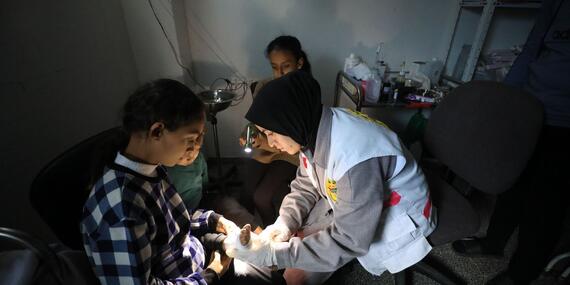Today's top news: Occupied Palestinian Territory, Sudan, Ukraine

Occupied Palestinian Territory
Israeli bombardments have continued across the Gaza Strip, alongside ground operations and fighting between Israeli forces and Palestinian armed groups and the firing of rockets into Israel by the latter.
Today, the Israeli military reiterated its call upon residents to leave an area, originally designated for evacuation on 22 December, covering about 15 per cent, or roughly 9 square kilometres, of Deir Al Balah governorate in central Gaza. Before the onset of hostilities, it was home to nearly 90,000 people, and it now includes six shelters that have accommodated about 61,000 internally displaced people, mostly from the north. In recent days, humanitarian partners have reported an influx of internally displaced people from Deir Al Balah governorate to the already overcrowded south.
On 25 December, the World Health Organization (WHO) visited Al Aqsa hospital and reported that the facility had taken patients far beyond its capacity in the wake of attacks in Deir Al Balah governorate.
WHO, UNICEF and the UN Relief and Works Agency for Palestine Refugees in the Near East (UNRWA) have been delivering vaccines to Gaza to protect children from preventable diseases. Yesterday, 80,000 vials of the measles, mumps and rubella vaccine arrived in Gaza, with other shipments on the way.
On 23 December, WHO, OCHA, UNICEF and World Central Kitchen, supported by UN Department for Safety and Security and UN Mine Action Service, visited hospitals in the north. They delivered supplies to Shifa hospital, including fuel for backup generators running vital services. The mission was carried out amid dire food shortages - some people took supplies directly from delivery trucks, underscoring how desperate the situation is.
Earlier today, the Palestinian telecommunications company announced that all services across Gaza had stopped. Humanitarian agencies and first responders have warned that recurrent telecommunication blackouts jeopardize the already constrained provision of life-saving assistance.
Sudan
OCHA is deeply concerned about the severe impact of the conflict in Sudan on access to health care, as a worsening cholera outbreak continues to spread across the country.
The number of suspected cholera cases has increased by more than 100 per cent over the past month, with nearly 8,300 suspected cases and more than 200 deaths reported in nine states as of 23 December, according to the WHO and Sudan’s Ministry of Health.
This includes more than 1,800 suspected cholera cases in Aj Jazirah state, where intense clashes between the Sudanese Armed Forces and Rapid Support Forces this month have displaced at least 300,000 people.
The humanitarian community in Sudan has been working to support the detection and treatment of cholera cases, as well as vaccination campaigns, but the ongoing fighting continues to hamper response efforts and disrupt access to basic public health services. Roughly two-thirds of Sudan’s population lacks access to health care, with more than 70 per cent of hospitals in conflict-affected areas no longer functional.
Ukraine
The UN and humanitarian partners in Ukraine continue to support civilians who have been severely impacted by Russia’s invasion, as the onset of winter heightens their suffering.
On Christmas Day, the Humanitarian Coordinator Denise Brown led an aid convoy to the Kharkiv Region, bringing food, blankets, winter clothes, hygiene kits, and home repair supplies to nearly 1,500 civilians in Kivsharivka, a front-line town that has been devastated by the war.
While in Kivsharivka, Ms. Brown reported hearing the constant sound of explosions and artillery fire. Residents and local authorities said ongoing shelling has disrupted their access to critical services and supplies, deepening their reliance on humanitarian assistance. Many of those remaining in Kivsharivka are older people, people with disabilities, and other vulnerable groups.
On Christmas Eve, Ms. Brown and a group of aid workers visited Hroza, where a 5 October attack killed 59 people, roughly 20 percent of the village’s population. Ms. Brown spoke with some of the survivors she first met while visiting Hroza the day after the attack. In the immediate aftermath, the UN and humanitarian partners delivered household items, hygiene supplies, and home repair materials, as well as cash assistance and psychological support, to civilians in Hroza.
This year, the humanitarian community has provided life-saving assistance to more than 970,000 people in the Kharkiv Region. Across Ukraine in 2023, the UN and partners have reached more than 10.5 million people whose lives have been upended by Russia’s invasion.
